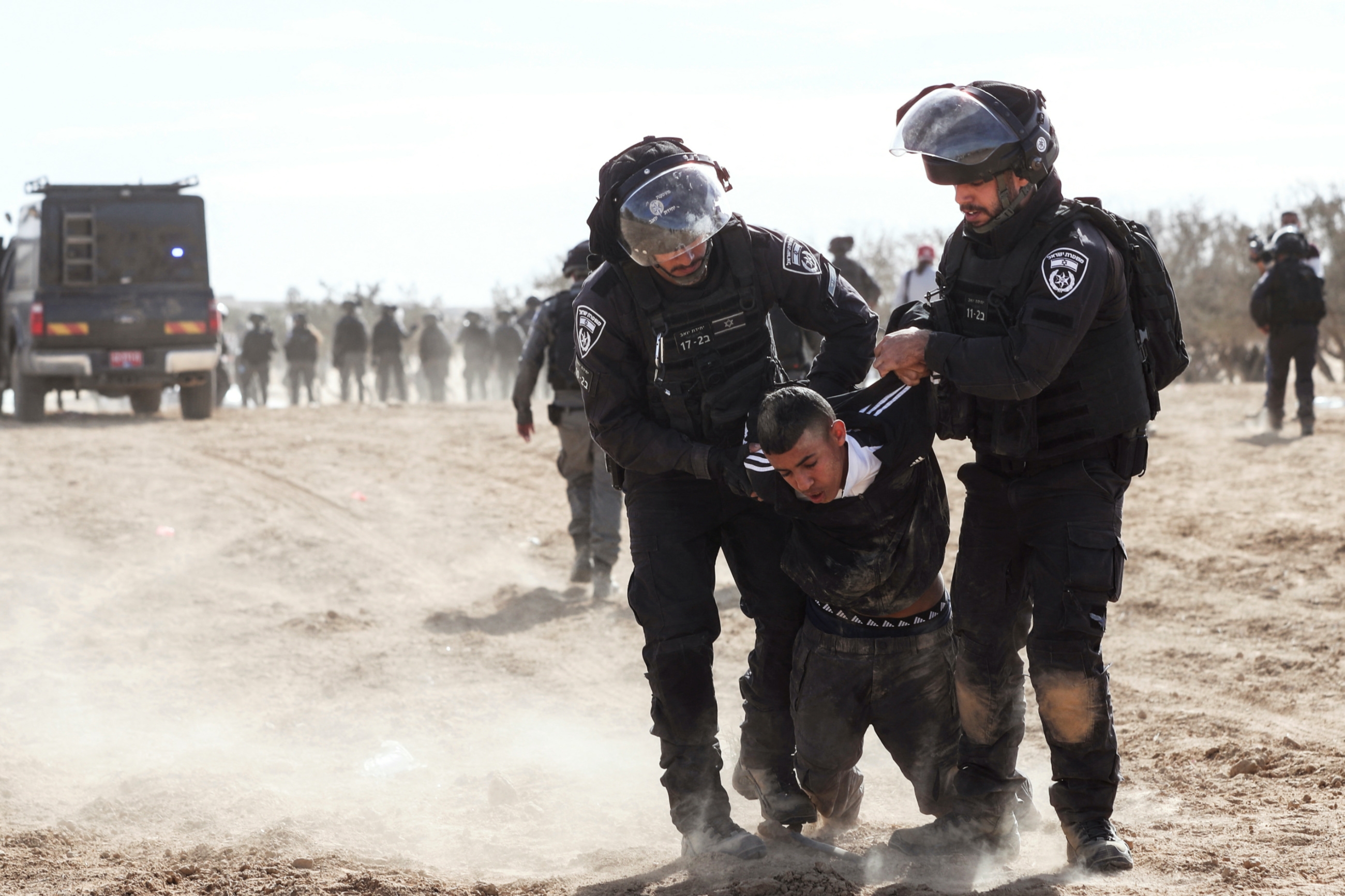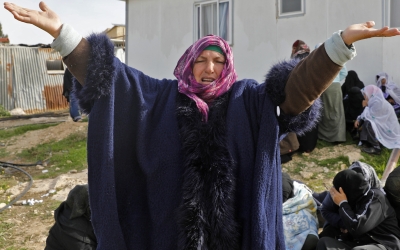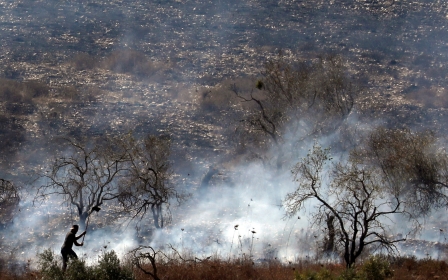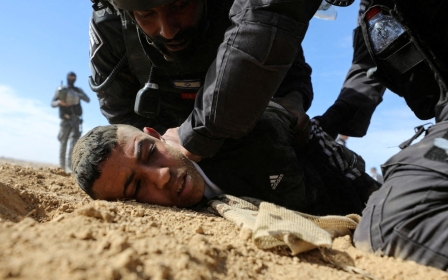Israeli press review: Bennett vows to pursue settler ‘lawlessness’ in Naqab and West Bank

Bennett says will act against violence
Israel will act against “pockets of lawlessness” in the Naqab (Negev) and the occupied West Bank, Israeli Prime Minister Naftali Bennett said in wide-ranging interviews with Israeli publications published on Friday.
Despite having previously defended settler attacks against Palestinians, Bennett told the Jerusalem Post that he had ordered the heads of the Shin Bet, Israel’s security agency, and the military to put an end to violence by Jewish settlers in the Palestinian towns of Burin and Huwara in the northern West Bank.
“There is a police force and there is an army, and there is also terrible Palestinian violence that has led to acts of murder, including recently,” Bennett told Haaretz.
Last week, settlers beat Palestinians and Israeli activists with clubs and shovels as they planted trees near Burin. Two days later, settlers vandalised Palestinian shops, homes and vehicles in the town of Huwara, in a violent attack that left three Palestinians wounded.
Also last week, Israeli settlers seized a plot of land in occupied East Jerusalem's Sheikh Jarrah neighbourhood.
The prime minister in December defended settlers who attacked Palestinians in another incident in Burin, calling their attacks insignificant and describing them as a “protective wall”.
“I will not allow this to continue,” Bennett said of the violence in his interview with the Jerusalem Post. “We will act against pockets of lawlessness in the Negev, in Judea and Samaria - everywhere,” he said, using the biblical name of the West Bank.
Tensions in south Israel's Negev have also been brewing, as Israeli forces brutally crack down on Bedouins amid a controversial forestation plan by the Jewish National Fund (JFN) that requires ploughing over lands and wheat crops of Palestinians.
The plans were halted earlier this month when the Israeli government pressured the JFN to stop its plan after four Arab Knesset members representing Palestinians in the Negev warned that they were not going to vote in support of future laws proposed by Bennett's government.
However, despite the pressures that his government is facing, both from his own lawmakers, Europe and Washington, to deal with the issue in the Negev, Bennett told Israel Hayom that the JFN plan should be carried out.
“There were a few who said not to plant the trees, and I said they should be planted the next day,” he said.
"There are laws, and they can bring in as many police as they need to – trees will be planted, and after that, I'm willing to talk with everyone."
Occupation unsustainable, says ex-army chief
Israel's former military chief of staff, Gadi Eisenkot, warned that Israel was "a hair's breadth away" from a third intifada led by Palestinian youths, who are making the Israeli occupation of Palestinian land increasingly challenging to sustain.
In an interview with Maariv, Eisenkot, who served as the head of the military from 2015 to 2019, said it has become difficult to predict what the new Palestinian generation, who has known nothing but the occupation, could do, adding that it was only a matter of time before the Palestinian street erupts once more.
'We need to change the reality of the situation because it will lead to a single state, which will destroy the Zionist dream'
- Gadi Eisenkot
"The question is not whether there will be another outbreak, but when and how intense it will be. It is quite clear that this will happen. There's no way that it's not going to happen," he said.
Eisenkot said Israeli officials lack a vision of what a settlement with the Palestinians could look like, which has resulted in an increasingly precarious political climate in Israel and the occupied Palestinian territories.
The former chief of staff said that Hamas’ popularity in the occupied West Bank, which he claimed to be at between 70 and 80 percent, was a direct outcome of Israeli policies, calling on the government to set “an alternative” that works for Israel.
Eisenkot said Israel needs to set out a plan to improve ties with the Palestinians, as Palestinian President Mahmoud Abbas nears the end of his tenure, “to reduce hostility and strengthen trust”.
“We need to change the reality of the situation because it will lead to a single state, which will destroy the Zionist dream,” he said. “One does not have to be a genius to understand the significance of millions of Palestinians mixed in with us along with the complex situation with Arab-Israelis.”
The former general envisages a plan consisting of a joint effort primarily between Israel, the Palestinians, Egypt, Jordan, the United States, and one that includes “gradual separation” from the Palestinians and the establishment of autonomy for them in the West Bank.
The plan would also see an increase in settlement building in the Jordan Valley, a significant improvement of civil and economic development in the West Bank, and the evacuation of illegal settlement outposts that do not promote Israel’s security, such as Evyatar and Homesh.
Israel set to discredit UN probe into Gaza bombing
Israel is planning a campaign to invalidate a UN commission formed to investigate alleged war crimes committed during Israel's military campaign on the Gaza Strip last year, according to a leaked Israeli foreign ministry cable.
Days after a ceasefire was reached between Israel and Hamas on 21 May, the UN Human Rights Council formed a permanent Commision of Inquiry with a broad mandate to probe possible crimes committed by both Israelis and the Palestinians in the occupied West Bank, Israel and the Gaza Strip.
The foreign ministry cable, seen by Israeli media, said that it was Israel’s “top priority” to discredit the commission’s work into Israel’s bombing of the besieged Gaza Strip and a wider probe into its treatment of Palestinians.
There are concerns in Israel about the extent of the damage to its reputation, especially in the West, that the commission’s report, which is due in June, could have if it labels it as an “apartheid state”.
According to the cable, the campaign’s objective is to delegitimise the commission, its members and reports either by preventing votes or delaying action, the Jerusalem Post reported. The foreign ministry is expected to intensify its campaign ahead of the UNHRC’s 49th session, due to be held in Geneva from 28 February to 1 April.
Navi Pillay, a former South African judge who served as UN high commissioner for human rights from 2008-2014, is leading the three-person panel, which also includes Indian expert Miloon Kothari and Australian expert Chris Sidoti.
Israel's bombardment of the Gaza Strip in May killed 248 Palestinians, including 66 children, while rocket fire from the besieged enclave was responsible for the deaths of 13 people in Israel. Some 30 Palestinians were killed in violence by Israeli forces and civilians in the West Bank.
The commission is the first one to be granted an ongoing mandate, which means the panel can pursue the inquiry indefinitely.
It is also not limited to investigating hostilities in Gaza and the West Bank, but will also examine “all underlying root causes of recurrent tensions, instability and protraction of conflict, including systematic discrimination and repression based on national, ethnic, racial or religious identity.”
Israeli press review is a digest of news reports not independently verified as accurate by Middle East Eye.
Middle East Eye delivers independent and unrivalled coverage and analysis of the Middle East, North Africa and beyond. To learn more about republishing this content and the associated fees, please fill out this form. More about MEE can be found here.





